Become an airline pilot
What training to follow to become an Airline Pilot?
Commercial piloting is an exciting world. For men and women who yearn to work in “the most beautiful office in the world”: the cockpit of a modern airplane... It’s an area that offers many opportunities as international, public and private air traffic is constantly on the increase. Yet it is also a very exacting field that requires rigour and technical mastery, one in which only the most qualified and stick-to-itive will one day see their dream come true...
To start one’s career as a commercial or airline pilot, you must get your CPL[A] licence and your IRME (IFR multi-engine) rating issued by a European Union member state. It is the only licence that enables one to work as an airline First Officer or co-pilot on an aircraft of over 5.7 tons in Europe and many other regions of the world.
2 possible courses:Integrated Airline Transport Pilot (ATP) training or modular CPL-MEP-IRME training
Integrated ATP training
In 2 years get your license and all the qualifications of Airline Transport Pilot

Cannes Aviation Academy offers this integrated ATP(A) training in France over 2 years, entirely in English.
The purpose of the ATP[A] integrated course is to train commercial pilots “ab initio” and bring them up to the skills level required to be First Officers or copilots on multi-pilot, multi-engine airplanes in commercial air transport service.
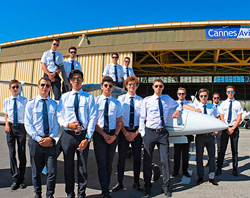

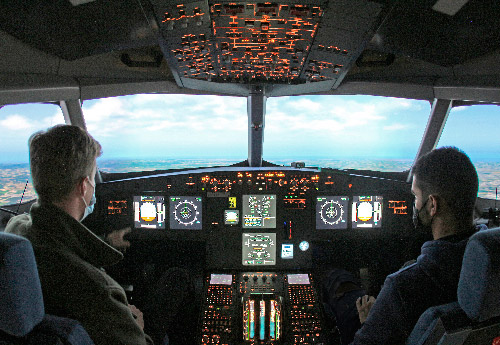
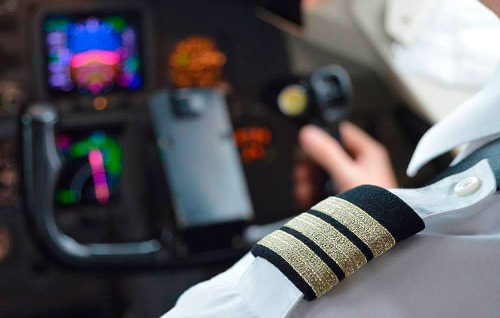
The instruction is highlighted with issuance of following EASA aeronautical titles:
- Airline Pilot theory certificate (14 certificates altogether)
- CPL[A] Commercial Pilot Licence
- IRME[A] and MEP(t) ratings for instrument flight on multi-engine aircraft
- MCC multi-pilot certificate
- Aeronautical English Certificate (FCL 055)
School starts in January, May or September each year. The annual promotion includes near 50 Student Pilots for high quality teaching. Candidates are admitted on the basis of a dossier and then on selection tests. It is also open to PPL pilots who benefit from a reduction of course and thus of budget.
Upset Prevention and Recovery Training
Part of the Cannes Aviation integrated ATP training since 2014, this UPRT training, which takes place on a single-engine Extra 200 aerobatic aircraft configured in 2 tandem seats, is mandatory according to the European AirCrew regulation in order to master the following situations:
- “flight at critically low air speeds, recognition of recovery from incipient and full stalls, spin avoidance”
- “unusual attitudes and simulated engine failure”
This allows you to learn to master unusual situations such as spin recoveries, steep turns or dynamic stalls.
Airline Pilot Standard Multi Crew Cooperation (APS MCC) course More details bellow.
APS MCC training has recently been developed by the airline industry to meet the requirement for airline experience prior to undertaking a type rating with a commercial operator.
The Cannes Aviation Academy's APS MCC course was created using the System Design Methodology (ISD) in partnership with Aviation Partners and Specialists (APS). It is specifically designed for the flight model used in our A320-based simulator.
Open to student pilots who have already obtained their CPL and IRME (end of integrated ATP or end of CPL-MEP-IRME modular training), the APS MCC course presents a complete training on airline practices to facilitate the transition to flight operations. Advanced exercises such as upset prevention and recovery, as well as in-flight training, will provide the confidence and team skills needed to operate a modern, complex, multi-crew aircraft.
The Cannes Aviation Academy's APS MCC includes:
- Documentation and Computer Based Training
- Ground course : 35 hours
- 40 hours of MCC FNPT II Entrol A32 simulator, a true replica of an Airbus A320 cockpit
- Competencies are assessed at the end of the course in order to obtain the APS MCC certificate
The APS MMC is the course of the future to enter the most demanding airlines.
Modular Training
At your own pace, from PPL to CPL-MEP-IRME
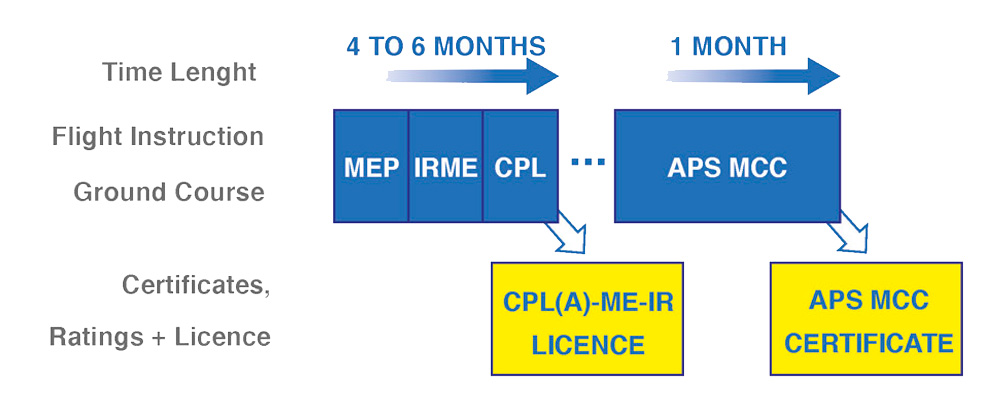
Aimed at pilots who already have their PPL and ATPL theory, this modular Commercial Pilot training allows to take into account financial constraints or professional or family imperatives.
After the PPL, the modular curriculum consists of 4 steps:
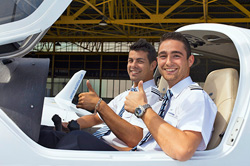
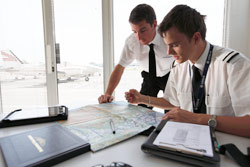
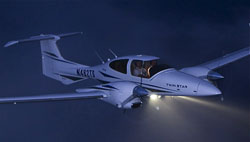
CPL-MEP-IRME training:
This module takes you through the most important step toward obtaining your twin-engine IFR rating tagged on to your commercial pilot licence.
The instruction leads to obtaining the following EASA titles:
- Commercial Pilot Licence CPL[A]
- IRME[A] and MEP(t) ratings for instrument flight on multi-engine aircraft
Prerequisite: see brochure CPL-MEP-IRME
APS MCC course:
More details bellow.Open to Student Pilots who have already obtained their CPL and IRME the APS MCC course provides comprehensive training on airline practices to ease the transition to flight operations. .
Alternatively, the Student Pilot may choose a simple MCC training which is cheaper, faster and accepted in most airlines, especially business aviation.
ATPL Therory
At school in english
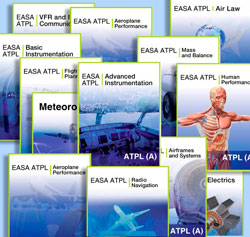
School starts in September, January or May.
To obtain the 14 theoretical airline pilot certificates in 10 to 12 months. On-site English language training by teachers, professional pilots.
Theoretical ATPL is required before entering the CPL-MEP-IRME training course. To enter theoretical ATPL training, you must have a PPL license and pass our selection tests.
The APS MCC TRAINING
To be fully trained for the most demanding airlines
The Airline Pilot Standard Multi Crew Cooperation (APS MCC) training has recently been developed by the aeronotic industry to meet the requirement for airline experience before starting a type rating with a commercial operator.
In 2021, Cannes Aviation developed an APS MCC training offer that perfectly meets these new requirements: the acquisition of an FNPT2 MCC simulator based on an AIRBUS A320 and the design of an educational module with experts from the he aeronautical industry now allows us to offer you very high level training at a very competitive price. Acclaimed by all the students who have completed this training, it is a real "boost" that will give you the best chance of succeeding in your selections.
Open to student pilots who have already obtained their IRME , the APS MCC course represents a complete training on airline practices to facilitate the transition to first officer fonction.
This training is provided entirely in English.
The APS MCC training is included in the integrated ATP curriculum.

The Cannes Aviation Academy APS-MCC course includes:
- Documentation
- Self-service access to the Mock-up including an animated simulator.
- 35 hours of ground school.
- 40 hours of MCC FNPT II Entrol A32 simulator, a true replica of an Airbus A320 cockpit.
- The competencies are evaluated at the end of the course in order to receive the APS MCC certificate.
- The duration of the internship is then reduced to 2 weeks.
- In parallel, Cannes Aviation also offers you the simple MCC course with 20 hours of MCC FNPT II Entrol A32 simulator at an even more affordable price. ·
- The simple MCC is the minimum prerequisite to apply for an airline.
- La durée du stage est alors réduite à 2 semaines.
Financing
Your training can be financed in whole or in part by a loan
Cannes Aviation has set up a partnership with the bank Société Générale to offer you a progressive student loan at preferential conditions and rates.

Key conditions and benefits at a glance:
- Being a Student Pilot Cannes Aviation Academy in integrated ATP(A) training,
- Loan amount: up to the full cost of the training,
- Total duration of the flexible loan: from 1 to 10 years with the possibility of deferring the start of repayment,
- Fixed E.I.G : < 1% as of 15/01/2021
- Insurance optional,
- Third party security required,
- Subject to acceptance of your application by Société Générale.
To benefit from this offer and to know all details:
Agence de Mandelieu
495 avenue de Cannes
Tél. : +33 (0)4 93 93 60 35
Agence de Cannes La Bocca
1 rue de la Verrerie
Tél. : +33 (0)4 93 47 00 74

Housing
Directly or via our partner, accommodation close to the school
Cannes Aviation Academy, directly or via its partner Legendre Sud Immobilier, can provide you with attractive housing close to the school.

Furnished 1 bedroom apartments
• 2 rooms of about 30 m2
• Starting 590€/month + service charges
Résidence LE CANNES BEACH
11, avenue Pierre Semard - 06156 Cannes la Bocca
Testimonials
Opinions, Testimonials and Careers of former student pilots
Results / Satisfaction
Internal study carried out by the compliance department for the year 2024
Theoretical ATPL: 92% success rate on first attempts out of more than 600 exams taken.
Practical exams (CPL-MEP-IRME training, integrated ATP, APSMCC): 95% success rate in practical exams on first presentation, 94% of students indicate that they were "satisfied" or "very satisfied" with their training and 98% of students would recommend the school